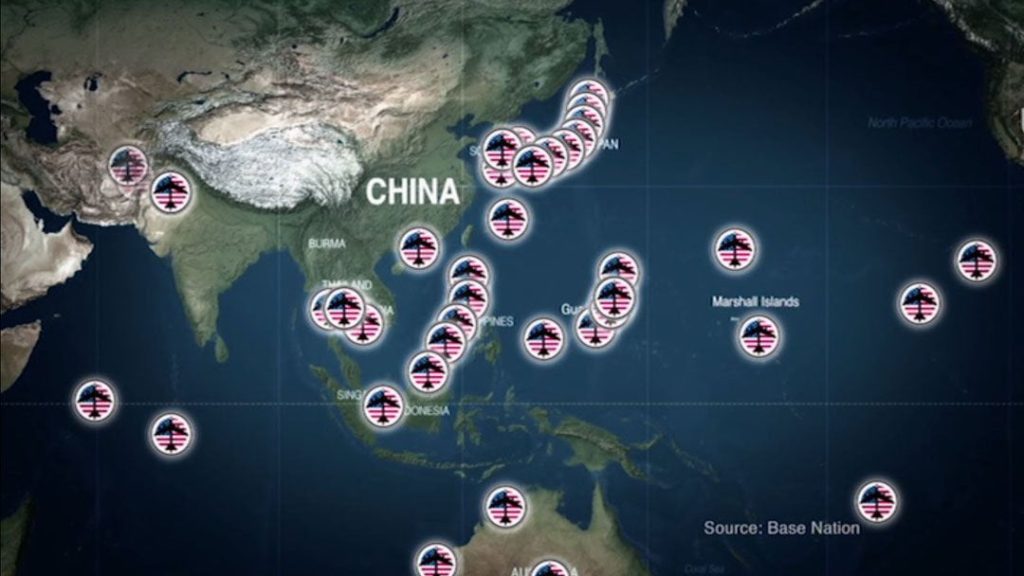
Foreign Policy Journal
Amid continued sensationalist media reporting on Covid-19 and China, tensions mounted as the US flew sorties over the South China Sea late last week. According to reporting from Air Force Technology.com:
US Indo-Pacific Command has confirmed that two airforce bombers have conducted a 32- hour round-trip sortie over the South China Sea.
The operation included two US Air Force B-1B Lancers from the 28th Bomb Wing, Ellsworth Air Force Base in South Dakota.
The sortie was undertaken as part of a joint US Indo-Pacific Command and US Strategic Command (USSTRATCOM) Bomber Task Force (BTF) mission, to reaffirm US Air Force presence in this contested region and reassure its allies.
In a statement, US Indo-Pacific Command said: “This operation demonstrates the US Air Force’s dynamic force employment model in line with the National Defense Strategy’s objectives of strategic predictability with persistent bomber presence, assuring allies and partners.”
This exercise followed a similar bomber run conducted jointly the week before with Japan. Antiwar.com noted that provocative US military actions in the South China Sea have tended to come from the Navy and that the use of air bombers appears to represent an escalation:
With the US Navy constantly strained, the use of planes might be a more convenient option for the US. At the same time, US planes flying deep into Chinese territory to challenge China creates an even bigger risk of a confrontation in the area.
Officials are presenting these as “deterrence missions” as a way to justify them. The US military almost certainly wouldn’t consider comparable operations from China over US territory a “deterrence,” however, and if anything these are deliberately provocative.
These escalations are occurring a month after Chinese president Xi Jinping was reportedly presented with a report from his security minister warning that, amid the barrage of anti-China rhetoric coming from the US media and political class regarding the coronavirus – now including calls for an international commission to investigate China and WHO, the risk of conflict between the two countries was higher than at any time since the events at Tiananmen Square in 1989. According to Reuters, which originally reported on the existence of the warning to Xi:
BEIJING (Reuters) – An internal Chinese report warns that Beijing faces a rising wave of hostility in the wake of the coronavirus outbreak that could tip relations with the United States into confrontation, people familiar with the paper told Reuters.
The report, presented early last month by the Ministry of State Security to top Beijing leaders including President Xi Jinping, concluded that global anti-China sentiment is at its highest since the 1989 Tiananmen Square crackdown, the sources said.
As a result, Beijing faces a wave of anti-China sentiment led by the United States in the aftermath of the pandemic and needs to be prepared in a worst-case scenario for armed confrontation between the two global powers, according to people familiar with the report’s content, who declined to be identified given the sensitivity of the matter.
Read the full article here.
Reporting yesterday in the Hong Kong-based South China Morning Post confirmed that the Chinese political class has now accepted that both countries are in the midst of a new Cold War.
“The United States and China are actually in the era of a new Cold War,” said Shi Yinhong, an international relations professor at China’s Renmin University and an adviser to China’s State Council, effectively the country’s cabinet.
“Different from the Cold War between the US and the Soviet Union, the new Cold War between the US and China features full competition and a rapid decoupling. The US-China relationship is no longer the same as that of a few years ago, not even the same as that of a few months ago.”
….Yu Wanli, deputy director at the Lian An Academy think tank in Beijing, agreed that US-China relations were at their lowest point since the Tiananmen crackdown.
“I had always been optimistic about the US-China relationship until recently. In the past, you could always find pro-China voices on the US political spectrum, but there is no such voice in the Trump administration,” Yu said, pointing to a recent Pew poll of 1,000 Americans which found that 66 per cent of respondents held an unfavourable view of China.
Read the full article here.